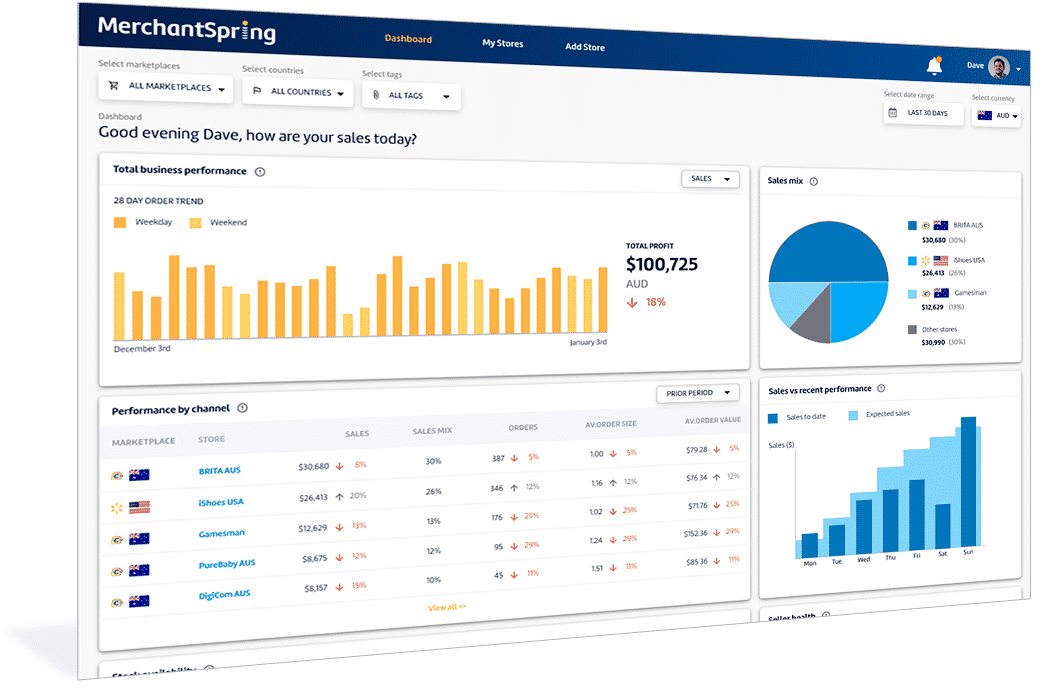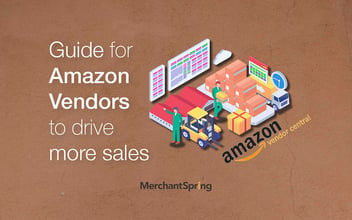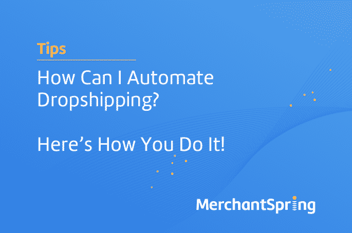Crafting a Successful Cross-Functional Team - Sales
Overview
In this episode, Bruno Ferreira, the founder of BlueDot Ecommerce, joined Paul Sonneveld and discussed Sales, the first of the three-part series on how to build the best-in-class cross-functional team for the Amazon Vendor Channel platform.
Complete Transcript of the Podcast
Introduction
Hi everyone, and welcome to another live episode of Marketplace Masters, brought to you by MerchantSpring, the leading Marketplace analytics platform for Amazon agencies, and vendors. Now Marketplace Masters as you know is all about going deeper into the challenges that vendors and agencies face to really lift the channel's performance via what we try to do via practical actions and insights.
Paul Sonneveld
Today, I'm your host, Paul Sonneveld and we are going to start a bit of a journey because we've got three sessions in store. He was starting with the first one, the journey is about as an Amazon Vendor, how do you build the best-in-class cross-functional team for the Amazon Vendor Channel? Now to help us do this, I have invited Bruno Ferreira to join us today to share his expertise.
Bruno Ferreira
Hi Paul.
Paul Sonneveld
Hey Bruno. Welcome on the show. Let me formally introduce you before we get into it. So, Bruno is the founder of BlueDot Ecommerce, a full-service expert, partner, specifically targeting Amazon Vendor Central's in-house integrated operations.
So he works specifically with cross-functional teams spending the entire supply chain, everything from sales to Logistics and finance. He’s also in fact, I don't think I know anyone else in the Amazon community who's being more involved in setting up Amazon Vendor accounts across the globe.
So he's been doing this for about seven years everywhere from South America, the US, the Middle East, India, Asia Pacific, you name it. There is probably not a country that Amazon operates in where Bruno has not set up an Amazon Vendor account and you know, helped companies build organizational capability to do that.
So it goes without saying, he brings a lot of experience to the conversation today. So after that, very impressive intro, Bruno. Welcome to the show today, and thank you so much.
Bruno Ferreira
Thank you for having me, Paul.
Paul Sonneveld
It's an absolute pleasure. Look I thought to kick us off, I actually wanted to start with the bit that we’re all familiar with, which is the Amazon Vendor Central Interface right? Because when we talk about cross-functional teams, I imagine everyone is supposed to be in there and using it right? It's kind of the central source, particularly with Amazon's preference for self-service as many things. But you know that interface is really hard to navigate if you're not trained properly.
Bruno Ferreira
Yeah.
Paul Sonneveld
From everything you've seen, what are the biggest challenges in your mind?
Bruno Ferreira
Well, from my experience Paul. All of these years got me a lot of examples. How I can even call it the web interface, the Vendor Central web interface is kind of like a maze. It's if you don't have the knowledge if you didn't get the proper training if you don't even know simple things like going to the web interface and process a deal, that would be a biggest challenge because then the self-service It's kind of very intuitive but what if you need to update it after?
So what I've experienced through all of these years is that usually companies get invited to supply Amazon through Vendor Central. It's, it's very important for companies. It's a good business with them if done properly, but then it becomes a bit of a blur, we get to sign usually a Vendor manager, but let's face it.
Vendor managers are good to help us with the initial setup, but then we are expected to run the day-to-day tasks to succeed with Amazon. Part of that includes the logistics side of it. How to request the labelling, Finance. So, we know our bit of a blurry, sometimes to reconciliate payments with these actions, from the co-op agreement, shortage claims all of that.
So each one of those tasks have a specific part on the web interface and I did encounter people that could not navigate to the right place to complete the tasks. They were supposed to. I can give you an example. A recent example, I'm currently training a team on a company that got invited to start supplying the 910 EU countries.
And after the second session of training with the finance team, it was really good to hear from the head of accounting that finally I can start processing the payment from Amazon. And I'm like, what do you mean? Well, until now I couldn't even know why I can only see a payment number in my bank statement but I don't know exactly what they're paying and the value is never much. So it was a good thing to start training them. And finally, they could start processing the payment from Amazon Vendor Central.
From the sales team, usually, the challenges that the account manager internally we will face are mostly with reporting and how to build an efficient reporting structure. Way to measure KPIs, how to control profitability, and even stock availability in the catalogue. Amazon doesn't make things easy.
If you think about how we need to update the availability of a catalogue through the web interface, you can only do it manually, but there's ways that you can kind of build your system and make it much quicker, and more efficiently because we know that product availability is very important for performance with Amazon Vendor Central.
Paul Sonneveld
I've seen Amazon make a lot of improvements to their Vendor Central at least it vaguely looks similar to sell centre at least from a just to kind of, you know, a colour scheme and stalling point of view. But there is a definitely long way to go not intuitive at all.
Bruno Ferreira
Some parts are a bit similar to Seller Central but actually, from my experience, that's when I've met people that were starting with, Vendor Central coming from Seller Central, that was actually something that was even a bigger challenge because they were used to do things through Seller Central that way.
And then it's a bit similar to the colours and but the interface is super different. I'm not saying it's better or worse than Seller Central. I'm just saying it's different and everything is there for you to navigate. You just need to know where to look click and what is this for. And what can I gain in return if I build this report? or what do I need to comply with this requirement? All of those details.
Paul Sonneveld
Yeah, for sure. So, when you and I were talking about this webinar, you felt very strongly about doing 3 series actually or three episodes, In your mind, you'll really look at that kind of, there's three competencies, three pillars in order to establish a really successful relationship with Amazon. I just want to press you on that. You know, why do you think that is necessary that is key to success, you know, those three pillars, first of all, what are they? and why do you feel that way?
Bruno Ferreira
Well from my experience but I've noticed when things sometimes Companies don't pay too much attention When they start supplying in Vendor Central. They focus on profitability, How can I increase my volume and brand awareness? But then, they don't spend that much time looking inside the organization.
And from my experience, I've noticed that every single aspect requirement to comply with supplying Amazon Vendor Central who fall under one of these three pillars: Sales, Logistics, and Finance, and there's no task that will fall outside of this. And when you have that vision, if you can see it that way, that's what will allow you to create that cross-functional team. What I found out is that if you align these three pillars, that will be a strong basis for your performance success.
Amazon's performance is measured with a lot of detail. There's a lot of KPIs to consider but each one of those KPIs either performance which takes the account reconciliation from payments or the sales growth will all sustain if they are all aligned in that cross-functional team. Success will come, it might take some time for the team to interact with it. That's why I believe that strong processes internally like we're going to discuss ahead are very important for that.
Paul Sonneveld
Yeah, thanks, Bruno. Obviously those three pillars sales, logistics and finance, really sort of internal capabilities. I mean for me, it's really interesting because we haven't spoken a lot about internal capabilities and how you organize yourself. We spoke all about kind of how you do things on Amazon Vendor in other episodes, but this is critical.
But there are of course different components of this, right? There's people component human resource component, and then there's a process component as well. Can you tell me a little bit more about particularly many call them SOPs, Standard Operating Procedures? These can be very diesel, but a high level, what it could look like. What should they include?
Bruno Ferreira
Well, their standard operating process Paul will basically define the ways of working of the cross-functional team. If you think that, when you're supplying to Amazon Vendor Central, of course, you will have a main point of contact from sales who is not acting as the manager of those people from the cross-functional team, but you will be managing everything related with Amazon. He needs to have a holistic overview of everything.
So, those SOPs basically will create the ground rules for the team to communicate, to process POs to the dispatch, for the invoices upload, and for the reconciliation who is going to dispute the shortage claims. What is the process to start a dispute over shortage claim? That's actually a good example. A lot of people struggle, it's a huge challenge for companies regarding chargebacks and shortage claims.
I believe that with these cross-functional teams aligned, it gets a bit easier and successful. Come if you think that for a dispute over shortage claim, you will need someone from Finance, is checking the payments and the deductions. We've noticed A shortage claim. It needs to discuss with the salesperson that will interact with Logistics, to get the PO proof of delivery to understand what caused the shortage claim or be chargeback to try to improve the processes.
All of these processes after implemented need to have a constant check and overview to try to improve them. They need to be scalable because they need to go as your business grows. And with Amazon Vendor Central, you can see that very quick in some periods and some categories.
So those SOPs those standard operating processes are a huge part for the success of the cross-functional team. It keeps them not isolated from each other, keeping the bridges between all the teams and the main point of contact from sales, of course, will overview everything.
Paul Sonneveld
I was going to say as you, I mean, you've stepped into a lot of organizations and work with Amazon Vendor teams. When you step into a new organization, maybe someone who has been operating on the Vendor platform for a while.
How well formulated are these SOPs? If I were to sort of look at 100 vendors across Europe, would they be able to pull out a folder and say look at our SOPs. Everything is documented with working together, you know, what's the level of maturity here?
Bruno Ferreira
I've seen a lot of examples Paul, and the majority of the companies, in my opinion, take a path that it might become a challenge going further, what I mentioning is that all of the companies that are invited to supply Amazon Vendor Central already have a business set up.
So there you have different clients in different channels, wholesale retail and I've seen a lot of companies to engage with the same SOPs. Yes, they do have the SOPs internally but they can see that those SOPs will adjust to Amazon Vendor Central and it's not exactly like that. You need to define specific SOPs for Amazon Vendor Central.
Amazon's requirements are a bit different from retail customers or even if you think about e-commerce, your play, like Ocado in grocery. If you go on the back you will see that actually the supply chain is more similar to a pure brick-and-mortar supply like ASDA or other names but not in any way similar to Amazon. Think about the requirements for packaging from Amazon, if you have items in your catalogue that need individual prep requirement, you will need to pay attention to that.
Amazon charges high fees on chargebacks. If you are not doing the prep-related tasks that you need. It might involve bubble wrap individually or products to deliver to the fulfillment centers. It's details like this that sometimes company like you said when you start it, there's a lot of people helping and well, a lot of agencies helping companies. When they start on Vendor Central with PPC and growing the business, the volume. And I've noticed that companies sometimes, don't look internally to do this definition.
To start with this cross-functional game. And then the cross-functional team will start with training. What is Amazon Vendor Central? We will start with the salesperson and then bring on board with finance and logistics, to define the SOPs. And then after all of that process, we will start checking and align for the best practices.
So if on one side you have the SOPs defined, that will include the cross-functional processes, and all the tools that you need, the responsibility is, what's each person supposed to do? What is my role in this cross-functional team? So the SOPs will define all of that. And then the best practices, communication between the teams, the salesperson will have the view of details like a brand registry.
You will take care of the performance reviews, interacting with the entirety and because performance usually comes from a very important part, like, when, when you dispatch Goods to Amazon, they're measuring your leaving time.
The chargebacks amount, all of that chargebacks are very specific rules that sometimes if people don't get trained, they are not aware of them. Why am I receiving this usually companies don't prepare internally, it will end on the finance team to find out wait a minute. So this invoice was x amount but they're only paying this and there's a deduction. What is it? Is it a chargeback? Is it a Co-Op agreement?
So once you align all of this with the cross-functional team and they are able to communicate and set up all the processes that's when success will come easily, that's when the performance metrics are fulfilled. And in my experience, it's been working really well and it's very positive when the team start engaging like this, you also have the advantage, Paul.
Some companies might think. Yeah, but I'm just starting my business with Amazon. It’s not yet to justify a dedicated team, but you must have in-house. So from Finance, it's the accounting department. Someone will dedicate 2,4,6 hours. Depending on the size of the business.
From Logistics, of course, it’s straining. The warehouse team how to Pick and Pack? How to request the labels? How to put each label in each box? And, what are the requirements for that? And then you will have the sales growing the account building the reports. Guiding the cross-functional team for success and grow the account. That's what we all want.
Paul Sonneveld
Yeah. Now that's in particular as you're growing, right? I mean I do want to sort of pause a little bit more on that question around dedicated team versus kind of you know sharing it right from a finance and a logistics point of view. It makes sense to tap into a kind of you know shared resource because these were also attended by definition be shared.
But you know a lot of times on the sales side, the account management side, people align to certain channels or retailers and what have you. And I guess the question that I eventually we'll get to is, when does it make sense to actually hire a dedicated account manager just for the Amazon Vendor channel, right? And I appreciate not many vendors will start out like that because it's probably a little costly. But when is a good time to make that investment?
Bruno Ferreira
Well, I will say Paul that the best time as I just said, so each company is already set up. I'm sure that within your sales team, you will have someone. The skills you need to search for someone to be the main point of contact on Amazon Vendor Central needs to have some soft skills and hard skills, you get a usual one. But needs to be someone that loves a good challenge. Loves something that will always change. Needs to be very efficient how the Amazon Vendor Central changes.
Amazon keeps updating. Even the web interface, it happened to me. Sometimes I will I'm working with some team and I opened my Vendor Central, and the web interface is a bit different recently, we had a lot of changes in the retail analytics. Everybody got a bit confused. And now we are all settling in the new interface. So I would think that to start with, depending on, of course, the predictive size of the volume, how many countries are you starting to Vendor Central and supply?
I would suggest that look inside on your teams, maybe there's someone there from sales that you can invest, that you can train. It's not necessary to have a background on online or e-commerce or even Amazon Vendor Central. We can drain it from pure retail experience to come here on board to Vendor Central, and train on the web interface.
Of course from Logistics, What do you need? You need someone that will help to define the SOPs to work with us with all the processes. Logistics is a very important part of this chain, the supply chain. And then you also need to go and train the warehouse team. So, the warehouse team is there already. They just need to learn how to do this to Amazon is a bit different from the others. Finance team, I will say the same, Paul. There's already someone there. You have your accounting team, hopefully, someone can dedicate a few hours.
I will suggest to start like this and then as you gain momentum, as you grow the account, or the account in several countries, then you can think and say, okay, this is taking too much time from my accounting person. I need to hire someone to dedicate full-time to Amazon.
The same from Logistics, I work with companies that invested a couple of months later just to have someone in the supply chain dedicated to Amazon, arranging the carriers. Negotiating the agreement with carrier as what's a preferred carrier to Amazon. What's the green light? Does this carrier has access to Green Light corridors on the Fulfillment center? all of those details. But to start Paul, I'm sure that a lot of companies just need to look inside and train the teams properly.
Paul Sonneveld
Yeah, no look, I think that's really what you're saying the most like it's already have some great resources and great people there. That can be trained initially to start with, and then obviously you can build out depth and expertise from there. Let's talk about the sales role in particular. The account manager account management, part of it.
Yeah, paint a bit of a picture for us, you know, what is a good account manager look like, you know, what does he do? And how can you distinguish between when or how do you see the difference? When you walk into a business, you know what between a great account manager particularly in the context of Amazon Vendor, of course, versus maybe an account manager, that is not yet up there.
Bruno Ferreira
Well, I will say, Paul, I will start to say that Amazon Vendor managers that are supposed to be a big part to support an account manager from a company are very good usually to help you to start to set up your listings. They can advise out to reign, how to run marketing campaigns all of that.
But when it comes to more technical tasks that you need to do, you might find yourself going through a rabbit hole. If you're sending emails to your Vendor Manager, to help you how to change in your catalogue, you can see that the brand owner is not your company, but you have the IPO of that and you have the brand registry, you can do that. You have a self-service tool to do that kind of task.
So when it gets to the more technical aspects, your Vendor Manager won't be there. They don't even have the knowledge and the expertise sometimes to do it because they work on the different interface on their side. So they don't actually have access to Vendor Central web interface like we see it. So I think it's a bit of a job when you start.
I've trained a lot of main point of contact for a cross-functional team through all of these years. And I can tell you that the first weeks, it's always a blur. I've had comments from people that I was training that they were dreaming with Excel sheets and Amazon Vendor Central. Because those first initial weeks, you just find yourself into a total new web interface and you might have a lot of experience with your ERP you worked with not have exact SAP, all of those. But then this is a new one with a lot of tools that you can access.
So another characteristic for a managing role for the account for Vendor Central, it needs to be multitasking. He needs to be aware that his job is to build a relationship with Amazon too. It's very important that he’s aware of that. Of course, you will be in contact with these Vendor Manager. You will be responsible for the negotiations.
When I train teams, I train them into end. I prepare them even for the negotiations for the CoOp agreement. So he needs to prepare for that, to know how to build a report. So to have some data skills it's also something important to have to be efficient in Excel. You will find that Excel.
Some people might not believe in that, but Excel is a very important tool. You just extract some reports you consolidate in a file. And with that data, you will get a lot of orders, a lot of answers to some questions. Of course, you will also be responsible to grow the account for the profitability of the account. So, you will be managing the sales side of Amazon Vendor Central. Saying that Paul, it's very important that that person is also aware and has some soft skills, like, teamwork, how to guide people.
From my experience, when you step into a company and you start supplying Amazon and you have all of these different things that you are trying to impose to the logistics or to the finance team, you need to have that capability to have to get people on board to bring them with you in the journey to not just set up the rules, the SOPs, but also explain them.
I think it's very important that when we are bringing someone on board to a new team, they need to understand what we're doing. I'm being removed from this that I was doing. Why am I being called here? What is this? This is complex. We are not making any way that much money. This is a lot of work and the sales manager role is also part of that is to explain where we are starting with, we want to go to have that vision.
So also he needs to have that marketing skills to know how to advise and where to go to investing in PPC, how to keep the Amazon net PPM to have all of those. As you can see in the slide, there's a lot of hands going on and you're in a lot of different sides of the Amazon Vendor Central that he needs to take care as the sales main point of contact and then additional to that all the responsibility to take care of the communication between the team to make sure that the SOPs are being followed.
And if you think about it, if you have someone, the main point of contact that is trained in all of these sides the three pillars, you will be helped. He can answer questions from Logistics. You can answer questions from Finance, he can help with all of those tasks because it will be aware everything going around that cross-functional team.
Paul Sonneveld
He suddenly seems like quite a unique individual in terms of characteristics. I know we've spoken before in terms of, you know, starting out. You may you know find people internal and promote them and train them but as you articulating, I guess what good looks like and all the different skills and not just the sales skills but I think there's a really strong across functional working, aligning with different stakeholders.
I imagined in many cases, the cross-functional team does not have a direct reporting line into this particular role. So actually it sounds like, working things inside the organization making things happen in a cohesive, being the glue almost as important as dealing with Amazon itself. And that's the bit that I always talk about how difficult it is. But I don't think the internal bid is any easier.
Bruno Ferreira
It's not but that's why I got this feeling that a lot of companies will need this help. Like, okay, I have my team or I'm setting up my team. Can you come here and help us out? How can we do this and you're right Paul. But for my experience and I've trained a few people to be the main point of contact in the cross-functional team and this works.
They go through a period that it's not fun. It's a lot of information because it needs to be quick because usually when I'm training this teams, they are already live and supplying so we are working on the back but we are already live. So there's a period of adjustment. But from my experience, the people that I trained, they start having fun after that project as soon as they start to connect the dots in the different size of Amazon Vendor Central, that's when you start to have fun and your team understands it and go with you in that journey.
I remember two years ago, I trained someone that was coming from a completely different background, he was coming from insurance, it has a very strong break ground in data analysis, computer science, but not much experience on e-commerce, Amazon less. And in three weeks, we managed to train him, and he was flying solo and a couple of months into it. He is such a big success.
It's one of the person's I've trained that I'm proud of. He's doing it. He's growing the account, everybody is happy, and even a few days ago, he told me, I remember in the beginning, I couldn’t understand sometimes what you were talking, and now it makes some mischance sense, and it's so good to have this fun and Amazon is trying to do this, but I know that it's better to do this.
So it's very important to have that mentality where you're going to. It's not just about coordinating the sales and growth on your account, it's bringing everybody on board and you're right. Stakeholders are very important to you. Need to have that communication skills. Control the narrative.
Sometimes you need to control the narrative because don't go to your line manager. with something it's not certain or if you want to try a new thing, explain it, build the plan, or don't go with an issue. Go with any solution, you need to have that mentality or problem-solving.
Paul Sonneveld
Yeah, no for sure. And I think just reminds me that actually, I think a lot of people with say seller experience will really struggle moving into such a role not because the technically they're on the standard but I think getting things done. I think we forget a lot of these organizations are big corporates or CPGs, very Matrix-type structures. So actually, getting things done is really, really hard.
What I took away from all of that is actually the Amazon skill set itself can be trained, you said it yourself and maybe there was an exceptional candidate three weeks. Got them up and running and he's doing great, but there must be, and I'm wondering if there's, you know, people might be listening to this going.
Well, I'm not sure we've got the right person in the role right now or maybe the raw vacancies is empty. I was thinking of just, you know, hiring someone with lots and lots of Amazon experience. But actually, I'm thinking about it differently now, right? If I'm going to hire someone for that role, You know, what are the characteristics that you look for the things that you would ride in a job posting? And that you would evaluate candidates on.
Bruno Ferreira
Okay, definitely someone that is very good working within a team to have some managing skills to bring people on board. To have some data skills, to know at least how to interact with Excel as a tool to build reporting, not just by themselves. A lot of Companies these days work with Power BI or Tableau but to know where is that data coming from? Because when you see it in the visualization sometimes you don't understand what's feeding that chart, that pie chart.
You need to understand what's behind that. So some data skills will be good. Some efficiency on Excel. To love a challenge definitely. To be prepared to go through challenges with your team to manage the frustration sometimes that you will get from Finance or from Logistics to be able to bring them on board again to explain, to train them to communicate on a stakeholder level.
That's very important to be able to expose a new plan, a change in the Strategic Plan, that was agreed. Or if there's an issue to be able to have that problem-solving skills, that will allow you to very quickly present a solution. It might not be the ideal but at that moment it's the one we have I can give you an example.
Recently, one of the things that I'm training, we notice that we set up new accounts recently and there was an issue in the beginning, the UK account is always a bit of the different when you are a European company. So we set up the account via our Amazon set up the account in Euros. But from our side, we had set up the payment, the bank details in GDP. So there was an error.
On one side, when we noticed was a bit too late because we without us noticing, since we were working with an API, we were receiving orders from the UK and the PO was in Euros, but the system without knowing, since we created all the setup of the ERP, all of that work to create the accounts vendor codes and all of that. Was it the invoicing in GBP? So that created the bit of an issue that we need to sort.
It's an urgent issue because we cannot upload those invoices. And we know that Amazon payment terms, if you have 60, 90 days, they start either from the delivery date or the invoice upload if you think that it's been 21 days now, we are only uploading the invoices next week hopefully and all of that work that will go around on this issue that was created not just as Amazon do they recognize they're helping us the vendor managing has been amazing helping us on this.
But from our side will require. So some the logistics contact that is already trained. The Finance contact that is already trained. We're going to set up this project team, so we will need to credit note, what's in Euros will need to re invoice? What's in GBP? So it's going to be a challenge that in this case, in this example, it's going to be the first challenge that this new cross-functional team is going through. And it's super interesting because the sales point contact has this mentality is still young, he’s keen to learn and he has this mentality.
People that know me know that one of my friends is everything can be sorted on Amazon, you just need to know where to go, how to talk, and what to do. So, yeah, sometimes you just set up, but everything can be fixed, everything.
Paul Sonneveld
Yeah, and you need to have a healthy problem-solving mindset, I think.
Bruno Ferreira
Yeah.
Paul Sonneveld
You know, there'll be plenty of them, but they're always solutions, which is true.
Bruno Ferreira
Sometimes out, you need to even step back and think about something that as long as it's compliant with the Amazon's requirement. You can do it. If it's only something internally, I can give you an example. One of the companies that I worked with when we notice, and when I stepped in the setup was already then and when I noticed the first thing that got my attention was the weight of the product. So the account was set up and we know that it's only 500 kilos, including the pallet to go to the Fulfillment center. So we had to restructure all of that.
My mentality at the time was always, so I was stepping in to set up a new cross-functional team, but with the Vendor Central set-up that was already done and my problem-solving, my knowledge, my experience with a Vendor Central allowed me very quick to sort all of these issues that should not have been done in the set-up time, but definitely thinking outside of the box as long as it's internally, your what you are changing is internally and it's for the best with Amazon requirement, that's a great advantage to have someone that can have that skill to learn problem-solving.
And from my experience, let me just say this I've noticed is that people that come from a background with data analytics and data skills are computer science. They have this mentality because it's a bit like programming is very similar. Its programming is basically solving problems. You have this and you want to do this. How can I do it through programming language or an Excel spreadsheet? I think it's very important.
Paul Sonneveld
Yeah, makes me think I should have become an account manager for an Amazon Vendor in a different career. Because I certainly love Excel, love solving problems. But I think what you're neglecting here is that experience counts for something too. The ability as you know not know, you're welcome to somewhere and you sort of, you can hone in on the issue very, very quickly. So that's for sure.
Bruno Ferreira
Of course, of course, that experience is very important.
Paul Sonneveld
Yeah. I'm sorry because we're now getting into the war Stories part which is the most interesting great and I'm sure that it's really deep and lots of great examples. But I am looking at the clock were about to hit 40 minutes, so we are unfortunately going to have to wrap it up Bruno.
But for everyone who's watching, and is disappointed about this, don't worry, we are going to have another two episodes in the next few months, focusing specifically on Logistics and finance to your meaty topics in itself. And I really look forward to bringing you back for that Bruno.
Bruno Ferreira
Yeah I'm looking for then I hope that People can participate in the next ones because that's when everything will get together and hopefully, people will have a better vision or what is this cross-functional team? Oh, I don't need to hire someone external. Maybe, I can just interact and look inside and create all of these things. So I hope that some people will engage with us next time.
Paul Sonneveld
Yeah, well, it's been absolutely amazing having you on our show today, Bruno. Thank you so much. For just sharing your knowledge, your expertise. I love the, you know, just those specific examples and topics of things and go wrong. I think we can all really resonate that.
Now, your full-term occupation is helping Amazon Vendors, do exactly this, right and particularly training them to really, you know, achieve that next level in terms of effectiveness and driving great commercial outcomes. Anyone that is interested in exploring your services or even just having a chat with you. What's the best way to get in touch?
Bruno Ferreira
Well, they can get in touch through my email. It's bruno@bluedotecommerce.com. I am still building. So BlueDot is still a recent thing that I've created, we started in July, so I'm still building. Of course, it's late as usual to the webpage for the company, but if you go to bluedotecommerce.com, you will also see the Info email there.
So just be in touch, drop me an email, and what I usually do is, I start interacting with the company. I do a quick of it, I identify what can be improved, what should be implemented. And we'll start from there.
It's not just for companies that are starting with Amazon. I can also help companies that are well established, supplying Vendor Central and we can review internally, how can we improve and make those processes to be more efficient. For the teams to have more visibility and of course traceability that it's very important with Amazon. If you lose track with Amazon, you're basically losing money. Don't lose trace of it.
Paul Sonneveld
That's certainly true. Well, thank you, Bruno. I look forward to the next session. Thank you so much, and till next time.
Bruno Ferreira
Thank you. Thank you, Paul.
Paul Sonneveld
And that is a wrap for today's episode. I hope you enjoyed it. Thank you so much for watching, and don't forget to check out merchantspring.io for exclusive offers for attendees of this webinar. Till next time, talk to you soon. Bye!















Add a Comment